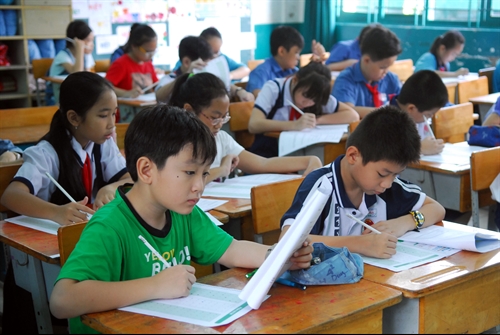 Society
Society

" />A shortage of classrooms in HCM City primary schools is the main barrier keeping students from day boarding, which includes staying at the school from early morning until late in the day, including lunch.
 |
| A class in HCM City’s Võ Trường Toản Primary School. Many schools in the city fail to offer day boarding for students because of class room shortages. — VNA/VNS Photo Mạnh Linh |
HCM CITY (VNS) — A shortage of classrooms in HCM City primary schools is the main barrier keeping students from day boarding, which includes staying at the school from early morning until late in the day, including lunch.
Nguyễn Quang Vinh, head of the city Department of Education and Training’s Primary Education Division, said that primary students at day boarding schools should attend no more than seven classes each day.
Vinh spoke at a meeting with the Culture and Social Affairs Board of the People’s Council held last week in HCM City.
He said that in the afternoon, students could study elective courses such as English, computer or others.
For the 2015-2016 academic year, the city has 515 primary schools. Day boarding is available at 430 of the schools, a drop of only 1.9 per cent compared to the previous year.
However, most of them are in only seven out of 24 districts, including 3, 5, 7, 9, 10, Nhà Bè and Cần Giờ.
The districts of Tân Phú, Bình Tân, Gò Vấp, Bình Chánh and 12 have under 50 per cent of day boarders in the districts.
Tân Phú District has the lowest rate in the five districts, with only 24.1 per cent, following District 12 with 27.4 per cent.
Tạ Tân, head of the Tân Phú District’s educational division, said that the district had seen an increase of 7,200 first graders each year.
The district’s proportion of day boarders is expected to rise to 35 per cent from 24.1 per cent by 2020, Tân said.
However, the speed of population growth is higher than the forecast, he added.
Trần Văn Phúc, deputy chairman of the Tân Phú District People’s Committee, said the district’s leaders were under pressure to build schools because of the rapid increase in students.
In addition, the number of teachers for elective subjects, especially English, is insufficient for day boarding, he added.
Phan Văn Quang, deputy head of Tân Bình District educational division, said the district has many old primary and secondary schools with insufficient space for day boarders.
This academic year, three more new schools were put into use. But they can only be used for half a day.
More than sixty-four per cent of students in the district are day boarders.
Lê Sơn, deputy chairman of the district People’s Committee, said the district would give priority to build more primary and secondary schools to reduce the “student overload”.
Solutions
Nguyễn Văn Hiếu, deputy head of the city’s Department of Education and Training, said that more than 14,000 classrooms by 2020 were needed for day boarding.
He said that private schools or centres should be allowed to work with public schools.
Under the co-operation, staff of private schools or centres could pick up students for day boarding after the end of the morning shift at the public school.
Hiếu said that at the private school, the students can have lunch, take a nap and take part in extra activities, as well as enroll in elective courses. Parents can then pick them up at 5 pm.
However, many parents, whose children study either in the morning or afternoon, are too busy to pick up their children, and use services provided by private schools and individuals to pick up their kids.
But since these private services are not regulated and have not been issued licenses, safety and hygiene cannot be assured, according to Hiếu.
The private services are expected to expand, particularly in industrial and export processing zones, as the number of day boarding slots at schools decline.
To solve the issue of safety and hygiene, Hiếu recommended that agencies such as Department of Labour, Invalids and Social Affairs and Department of Health work with the educational department to manage the situation.
The educational department could issue licences to the private schools and services, he said, adding that safety would be at risk if there was no oversight.
The local people’s committee should be in charge of frequent supervision of private schools and services, Hiếu added.
Thi Thị Tuyết Nhung, head of the Culture and Social Affairs Board, said she would ask the People’s Council to approve the implementation of the private services. — VNS